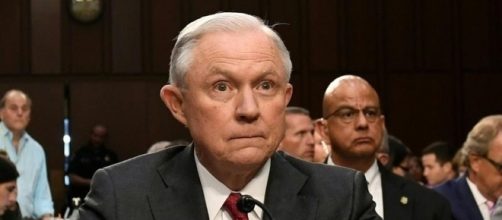Attorney General Jeff Sessions testified Tuesday before the Senate Intelligence Committee on Russian involvement with Donald Trump's presidential campaign.
The hearing was streamed live on all major news networks, and focused on Sessions's choice to recuse himself from the government's investigation on Russia, whether he had met with Russian officials, and his role in the firing of former FBI director, James Comey.
In his opening statement, Chairman of the Intelligence Committee, Richard Burr (R-NC), said it is rare for these hearings to be open to public, and yet this is the tenth hearing to be open this year -- the fifth on Russia.
Burr noted the open hearing could help the American public separate rumors from facts, and "make their own judgments."
Russian Contact
Vice Chairman Mark Warner (D-VA) acknowledged that Sessions had met with Russian Ambassador Sergey Kislyak at least twice during the campaign, despite Sessions denying contact with Russian officials at his confirmation hearing in January. In March, Sessions acknowledged the two meetings.
"I did not have any private meetings nor do I recall any conversations with any Russian officials at the Mayflower Hotel," Sessions said, when asked about a reported third meeting with the Russian ambassador.
Sessions said it was a Department of Justice regulation that caused him to recuse himself from the Russia investigation, and "not because of any asserted wrongdoing on my part during the campaign."
"That I participated in any collusion, that I was aware of any collusion with the Russian government to hurt this country, which I have served with honor for over 35 years, or to undermine the integrity of our democratic process," Sessions said, "is an appalling and detestable lie."
Senator James Risch (R-ID) asked what Session would have done if he had heard a conversation of Russian collusion during the campaign.
When asked if he would have headed for the exit, Sessions replied, "Maybe." Sessions later changed his answer during an exchange with Senator Martin Heinrich (D-NM), "I absolutely would have departed."
James Comey
Sessions said he discussed firing Comey with Deputy Attorney General, Rod Rosenstein, before either was confirmed.
Rosenstein had noted "serious problems" in Comey's performance, Sessions said, and they both agreed "that a fresh start was appropriate." Sessions added Comey's "lack of discipline" and improper handling of the investigation into former Secretary of State Hillary Clinton's emails motivated him to recommend Comey's termination in a letter to President Trump.
"The president asked us our opinion, it was given, and he asked us to put it into writing," Sessions said.
Senator Burr asked about the meeting where Trump asked everyone, including Sessions, to leave the room to talk with Comey.
"There is nothing wrong with the president having communication with the FBI director" Sessions said, adding that it is problematic for the president to talk to the director about an ongoing investigation.
Executive Privilege
When asked about conversations he had with President Trump, Sessions repeatedly referred to a Department of Justice policy which prohibits him from disclosing those conversations.
Sessions refused to comment on the policy when asked for details on it by Senator Kamala Harris (D-CA).
Senator Heinrich became frustrated with Sessions, "My understanding is that you took an oath, you raised your right hand here today and you said you would solemnly tell the truth, the whole truth and nothing but the truth.
And now you're not answering questions."
When asked if he was using executive privilege to not answer questions, Session said "I am not claiming executive privilege because that's the president's power."
In contrast to Sessions' open hearing, Comey referred topics to be discussed during the committee's closed session.
"Executive privilege is not waived by going into closed session," Sessions said, despite not having said privilege.


